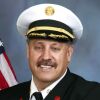As a chief fire officer or company officer, you’ll spend most of your time on tasks that don’t involve fighting fires, training or even writing reports. No, most of your time will be spent leading and managing your members. Each waking hour at work will likely include some interaction with at least one of your firefighters, staff, or another officer.
It is HOW you interact with your members that can determine your success as a leader. As such, it should come as no surprise that the most important skill for any chief or company officer to master is communication. And a great place to start is Dale Carnegie’s book “How to Win Friends & Influence People.”
Carnegie was an American writer, lecturer and the developer of courses in self-improvement, salesmanship, corporate training, public speaking and interpersonal skills. His book “How to Win Friends and Influence People” is perhaps his most popular leadership teaching, with more than 30 million copies of the book sold.
Many principles in the book can easily be applied to leadership for chief or company officers. Let’s review a few of the highlights:
Managing Type A personalities: The first section of the book deals with fundamental techniques in managing people. Many firefighters are Type A personalities. They put all their energy and efforts into most things they do as a firefighter – but they do not take criticism well. Carnegie addresses this issue: “Don’t criticize, condemn, or complain” since human nature does not like to admit fault or failure. Typically, they will become defensive and resent what you have to say. I am sure during your career, you have encountered a firefighter who would never admit they were wrong, although nothing could be further from the truth. Carnegie notes that we should never criticize, condemn or complain about our firefighters because it will never result in the behavior we desire.
Impressing others: One of my favorites sections of the book is found in the section that describes six ways to make people like you. Carnegie points out that we usually try to impress other people with our knowledge, experiences, resume or anything we think will influence them. Carnegie correctly points out that these people really could care less about you since humans are mostly interested in themselves first.
So, Carnegie contends that instead of trying to impress people to get them to like you, you should become interested in them. Ask questions about their background, experiences, wants, likes and other pertinent information. If you genuinely become interested in them, they will become interested in you in return.
Similar principles Carnegie addresses involve smiling, remembering that a person’s name is, to that person, the sweetest and most important sound in any language, being a good listener and encouraging others to talk about themselves, talking in terms of the other person’s interest and make the other person feel important – and do it sincerely.
Bringing about change: The last section of “How to Win Friends & Influence People” deals with nine ways how leaders can effectively bring about change in people without giving offense or arousing resentment:
- Begin with praise and honest appreciation;
- Call attention to people’s mistakes indirectly;
- Talk about your own mistakes before criticizing the other person;
- Ask questions instead of giving direct orders;
- Let the other person save face;
- Praise every improvement;
- Give the other person a fine reputation to live up to;
- Use encouragement, and make the fault seem easy to correct; and
- Make the other person happy about doing what you suggest.
Of course, many of these principles apply only in a non-emergency situation. If you are an incident commander managing an emergency scene, your job is not to make someone feel good and use encouragement to get them to do something. Your job is to manage the scene and mitigate the incident while keeping your firefighters safe to save lives, property and the environment.
These are still great change-focused principles to apply post-incident, like during an after-action review (AAR). No structure fire ever goes perfect, and there is always an opportunity to evaluate what went right, what went wrong and where improvements can be made. You may find some individuals who become defensive, even aggressive, if there is any hint that they may have done something wrong. Using the many principles found in Carnegie’s book to run the AAR may help those who are resistant to accept that there are always opportunities to improve and learn.
Helpful lessons for all
I personally have found many of these principles helpful over the years in the various roles I have held, including that last seven as a fire chief. I have also seen chiefs and company officers manage and lead people opposite of what the book suggests, and they have had a difficult time with their firefighters and others.













